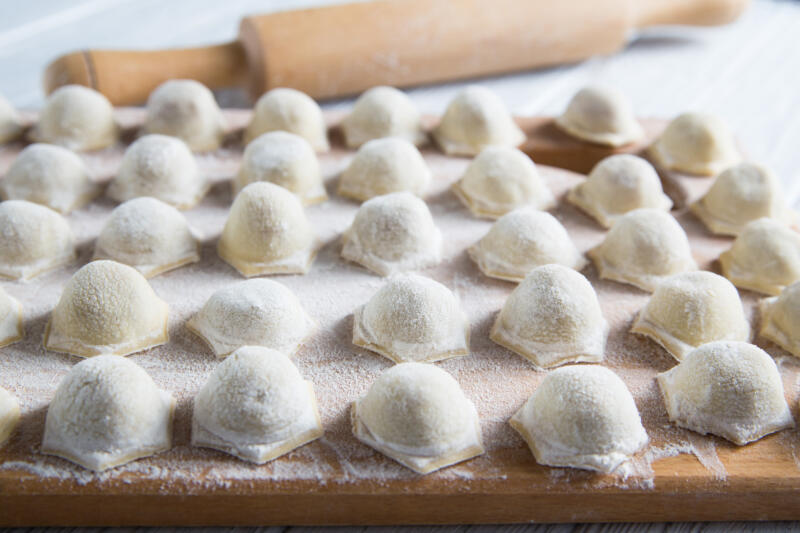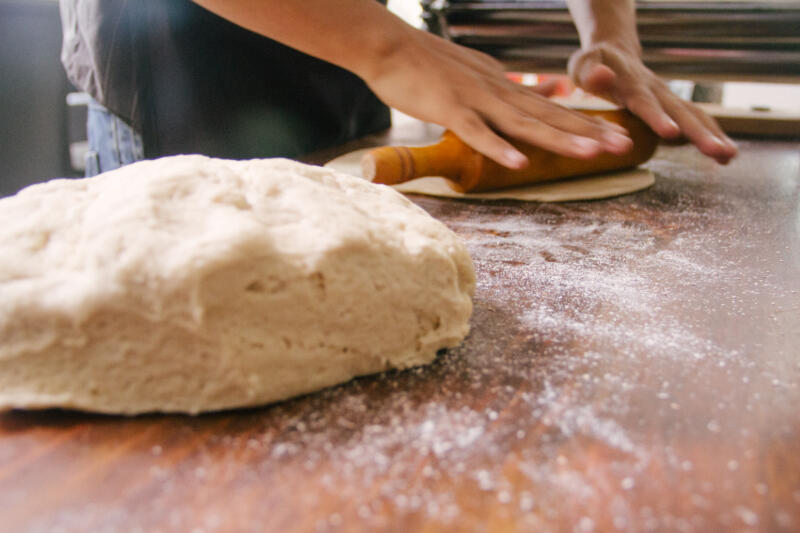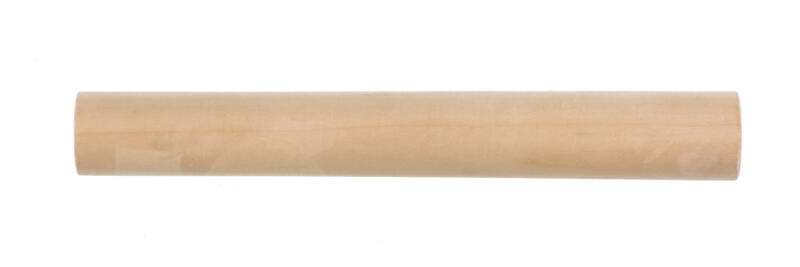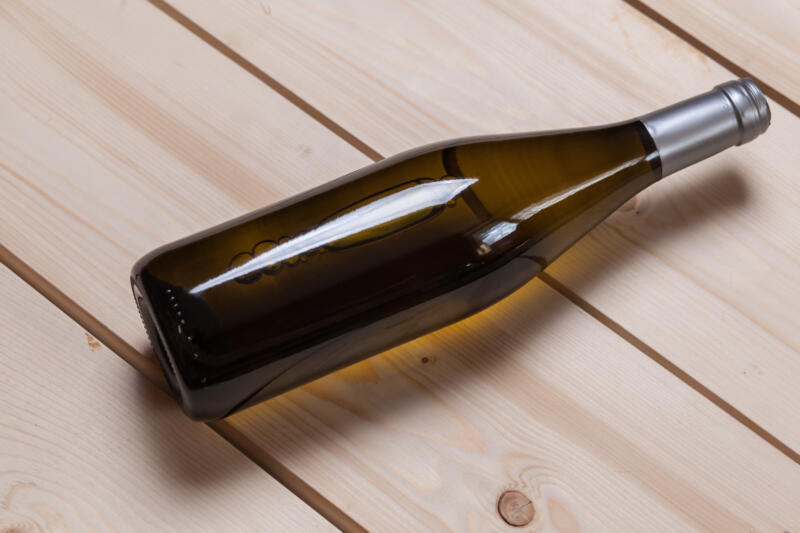In the world of baking and cooking, a rolling pin is a versatile tool. It’s not just for flattening dough for pies and cookies but also for grinding spices, tenderizing meat, and molding baking projects.

However, there might be times when you find yourself in need of a rolling pin substitute.
Whatever the reason, don’t worry! There are plenty of household items that can serve as effective substitutes.
Common Rolling Pin Substitutes

Before we dive into the specifics, let’s take a moment to appreciate the creativity of home cooks.
When faced with a challenge, they can turn ordinary objects into extraordinary culinary tools.
Here are a few common items that can be transformed into a rolling pin substitute.
1. Wooden Dowel

A wooden dowel can be a great rolling pin substitute. Especially if it’s larger in size, it can mimic the shape and functionality of a traditional rolling pin.
To use a wooden dowel, make sure to wash and dry it thoroughly first.
To avoid any potential wood splinters, we recommend covering your dough with plastic wrap before rolling it out. By doing so, you’ll achieve a uniform and flat base for your baked goods.
2. Beverage Cans

Believe it or not, beverage cans can also serve as a handy rolling pin substitute.
An unopened and chilled can provides the necessary sturdiness to flatten dough effectively.
When handling dough, particularly with pastries, maintaining a cold dough temperature is crucial. This ensures that the fats, like butter or shortening, remain solid within the dough.
When the dough is baked, these solid fat particles create pockets of air, leading to a flaky and tender pastry.
So, the use of a cold can is not just about providing sturdiness but also about temperature control and maintaining the quality of the dough.
To keep your dough clean and dry, roll it out using plastic wrap or parchment paper between the dough and the can.
3. Wine Bottle

Another handy rolling pin substitute that you might have lying around is a wine bottle.
To prepare the bottle, start by cleaning and disinfecting it thoroughly. This measure is essential to avoid transferring any bacteria from the bottle to the dough.
To further ensure cleanliness and to prevent the dough from sticking to the bottle, use parchment paper or plastic wrap.
When it comes to the rolling technique, use one hand to push the bottle down and the other hand to hold the neck of the bottle. This will give you control and stability while rolling out your dough.
4. Plastic Water Bottle
A plastic water bottle can also be a great rolling pin substitute. To add weight to the bottle, you can fill it with water and freeze it.
This will not only give you the heft you need for rolling out dough but also keep the dough cool, which is especially helpful when working with pastry dough. Remember to clean the bottle thoroughly before use.
If you’re using a frozen bottle, you might want to use gloves to prevent discomfort from the cold.
5. Common Household Items

In addition to the items mentioned above, there are numerous common household items that can serve as rolling pin substitutes.
The key is to consider the size and desired thickness of your dough.
Items like a clean thermos, a sturdy water bottle, or even a flashlight can be used.
Just ensure these items are clean, dry, and free of any sticky residue. Labels should be removed if necessary.
While these items may not be ideal for heavy-duty rolling, they can provide an interesting embossed effect on your dough if desired.
Remember, baking is all about creativity and making the best use of what you have on hand.
6. Vase
A vase might not be the first thing that comes to mind when you think of a rolling pin substitute, but a tall, smooth, and cylindrical vase can work surprisingly well for rolling out dough.
As with any alternative tool, ensure the vase is cleaned well before using it.
To prevent the dough from sticking to the vase, sprinkle it with a bit of flour.
With these simple steps, your vase can become an effective tool in your baking arsenal.
7. Pint Glass
A pint glass is another common household item that can double as a rolling pin substitute.
Its tall, cylindrical shape and smooth surface make it a convenient option for rolling out dough, especially for smaller surfaces.
A pint glass is particularly useful for softer dough that doesn’t require a lot of pressure. Plus, it can even be used to crush small amounts of biscuits for recipes that call for biscuit crumbs.
8. Ceramic Mug

A ceramic mug can also be a handy rolling pin substitute. The shape and size of a ceramic mug make it suitable for rolling out dough, especially for smaller baking projects.
If you find that the mug is too light, you can fill it with water for added weight. Just make sure to secure the lid properly to avoid any spills.
9. PVC Pipe
Lastly, a PVC pipe can be an unconventional but effective rolling pin substitute.
When choosing a PVC pipe, make sure it’s food-safe to ensure your culinary creations remain uncontaminated.
For added weight, you can fill the pipe with water or grains, and secure the ends with caps.
Remember, cleanliness is key in any kitchen, so make sure to thoroughly clean the pipe before using it on your dough. With a bit of preparation, a PVC pipe can be a surprisingly effective tool in your baking arsenal.
Using a Rolling Pin Substitute
Now that we’ve explored various substitutes for a rolling pin, let’s delve into how to use them effectively.
Whether you’re using a wooden dowel, a wine bottle, or a pint glass, the technique remains largely the same.
The key is to prepare your dough properly and avoid common mistakes that could affect the quality of your baked goods.
Preparing the Dough
Before beginning the rolling process, get the dough ready. First, form it into a ball and then gently press it down with your palms.
If your dough is too cold or firm, allow it to come to room temperature. This will make it easier to roll and shape.
To prevent the dough from sticking to your rolling pin or substitute, dust it lightly with flour or place it between two sheets of plastic wrap or parchment paper. This will provide a uniform and flat texture for your dough.
Frequent Mistakes to Avoid When Using a Rolling Pin Substitute
When using a rolling pin substitute, there are a few common mistakes to avoid:
– Over-rolling: Over-rolling can make the dough tough and hard to work with. Aim to roll just enough to achieve the desired thickness.
– Skipping a protective layer: Always place a layer like plastic wrap or baking paper between the dough and the substitute. This helps prevent the dough from clinging to the makeshift tool and ensures easy detachment.
– Not cleaning the substitute: Always ensure your substitute is clean and dry before use. It’s essential for ensuring food safety and avoiding any foreign contaminants in your dough.
Closing Thoughts
When it comes to rolling your dough, don’t be afraid to think outside the box.
The key is to maintain the dough’s temperature, and for this, you can use a variety of cold objects.
So the next time you find yourself without a rolling pin, don’t panic.
Just look around your kitchen, and you’re sure to find a suitable substitute. Happy baking!